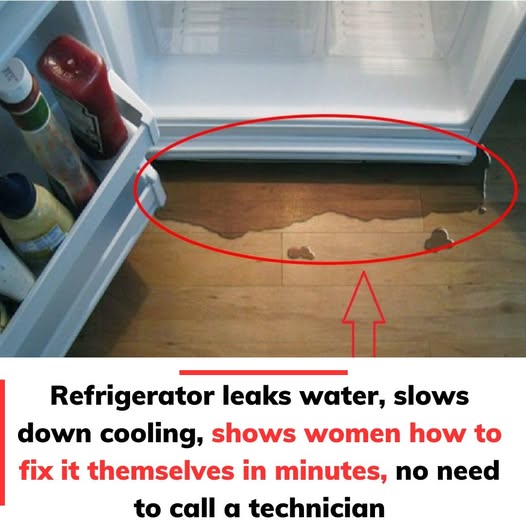ADVERTISEMENT
Refrigerator Leaks Water and Slows Down Cooling: Common Causes and Solutions
A refrigerator that leaks water and has a reduced cooling efficiency can be frustrating, especially when it disrupts your daily routine. Not only can these issues compromise the quality of your food, but they can also lead to more serious problems if left unaddressed. In this article, we’ll explore the common causes of water leakage and slow cooling in refrigerators, as well as provide practical solutions to fix these problems and maintain the optimal performance of your appliance.
Common Causes of Water Leakage in Refrigerators
- Clogged Defrost Drain: One of the most common reasons for water leakage in refrigerators is a clogged defrost drain. Most modern refrigerators have a defrosting system that periodically melts the frost that builds up in the freezer. The melted water is supposed to flow down a drain tube and into a pan at the bottom of the fridge. If this drain gets clogged with food particles, ice, or other debris, the water can accumulate inside the fridge, leading to leaks.
Solution: To fix this, unplug the refrigerator and locate the defrost drain, typically found at the back of the freezer or refrigerator section. Use a pipe cleaner or a small brush to gently clear the blockage. You can also pour a mixture of warm water and vinegar down the drain to help clear any stubborn buildup.
- Faulty Door Seals: If the seals on the refrigerator door are damaged or worn out, warm air can enter the fridge, causing condensation and water buildup. This excess moisture can leak out of the fridge and onto the floor.
Solution: Inspect the door seals for cracks, tears, or deformities. If you find any damage, you may need to replace the seals. To test the seal, close the door on a piece of paper. If the paper slides out easily, the seal isn’t tight enough and should be replaced.
- Dirty Condenser Coils: Condenser coils are responsible for releasing heat from the refrigerator. When they are covered in dust, dirt, or pet hair, they can’t efficiently dissipate heat, causing the fridge to overheat. This can lead to moisture buildup inside the refrigerator and cause leaks.
Solution: Clean the condenser coils regularly, ideally every six months. Use a vacuum with a soft brush attachment or a coil cleaning brush to remove dirt and debris. If the coils are located on the back of the fridge, simply pull it out from the wall to access them.
- Blocked or Frozen Evaporator Fan: The evaporator fan circulates air through the fridge to ensure that the temperature remains even. If the fan is blocked by ice or debris, it will not work properly, leading to poor cooling performance and possible water leakage.
Solution: Turn off the fridge and allow it to defrost. Check the evaporator fan for any ice buildup or debris and clean it carefully. Make sure the fan is running smoothly by turning it by hand to check for any resistance or obstructions.
- Improper Fridge Leveling: If the refrigerator is not level, the defrost water may not drain properly, causing it to pool inside the fridge or freezer. An unlevel fridge can also cause the door to not close properly, leading to condensation buildup.
Solution: Use a level to check if the fridge is standing upright. Adjust the feet of the refrigerator as needed to make sure it’s perfectly level. This will ensure that water drains correctly and the door seals properly.
- Water Filter Issues: Some refrigerators are equipped with a wat
